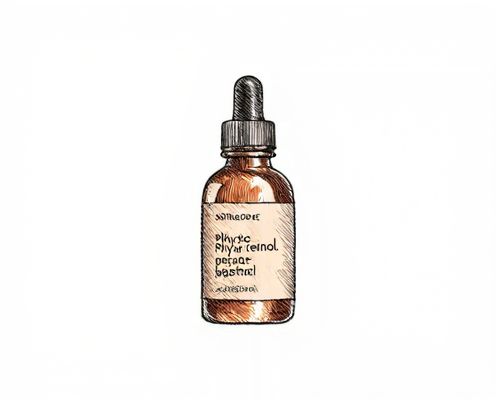
Phyto-retinol Illustration
Phyto-retinol is a plant-based alternative to traditional retinol that provides similar anti-aging benefits without irritation. Rich in botanical compounds, phyto-retinol promotes collagen production and improves skin texture for a youthful, radiant complexion. This gentle ingredient is ideal for sensitive skin types seeking effective wrinkle reduction and enhanced skin renewal.
Introduction to Phyto-Retinol: A Plant-Based Retinol Alternative
Phyto-retinol is a plant-based retinol alternative derived from botanical sources such as marigold or sunflower extracts, offering similar skin benefits without the irritation often caused by synthetic retinol. This natural compound stimulates collagen production, enhances cell turnover, and improves skin texture, making it suitable for sensitive skin types. Incorporating phyto-retinol into skincare routines provides effective anti-aging and brightening effects while minimizing redness and dryness.
How Phyto-Retinol Works for Women's Skin
Phyto-Retinol, derived from plant-based ingredients, stimulates collagen production and accelerates skin cell turnover, leading to smoother, more youthful skin in women. It reduces fine lines and hyperpigmentation without the irritation common to synthetic retinol, making it ideal for sensitive skin. By balancing oil production and enhancing skin texture, Phyto-Retinol improves overall complexion and promotes natural radiance.
Key Benefits of Phyto-Retinol for Skincare Routines
Phyto-retinol, a plant-based alternative to traditional retinol, offers effective anti-aging benefits by stimulating collagen production and enhancing skin elasticity without the irritation commonly associated with synthetic retinoids. Its antioxidant properties help protect the skin from environmental damage and reduce the appearance of fine lines and wrinkles. Ideal for sensitive skin types, phyto-retinol promotes a smoother, more radiant complexion while supporting overall skin health.
Comparing Phyto-Retinol and Traditional Retinol
Phyto-retinol, derived from plant sources such as bakuchiol, offers a gentler alternative to traditional retinol by minimizing irritation while promoting collagen synthesis and cell turnover. Unlike synthetic retinoids, phyto-retinol provides antioxidant benefits and enhances skin texture without causing dryness or redness commonly associated with retinol. Studies show phyto-retinol achieves comparable anti-aging effects, making it suitable for sensitive skin and daily use in skincare routines.
Efficacy of Phyto-Retinol: What the Research Says
Phyto-retinol, a plant-based alternative to traditional retinol, demonstrates significant efficacy in promoting collagen production and improving skin texture. Clinical studies reveal its ability to reduce the appearance of fine lines and wrinkles while minimizing irritation commonly associated with synthetic retinoids. Research highlights phyto-retinol's antioxidant properties, enhancing skin cell regeneration and providing anti-aging benefits for sensitive skin types.
Safe Integration of Phyto-Retinol in Daily Skincare
Phyto-retinol, a plant-based alternative to traditional retinol, offers effective anti-aging benefits with reduced irritation, making it suitable for sensitive skin types. Incorporating phyto-retinol into daily skincare routines should start with low concentrations to allow skin acclimation and minimize potential sensitivity. Consistent use alongside moisturizing and sun protection enhances skin renewal and collagen production while maintaining barrier integrity for safe, long-term results.
Best Practices for Women Using Phyto-Retinol Products
Women using phyto-retinol products should start with a patch test to minimize irritation, gradually introducing the product into their skincare routine every other night. Applying a broad-spectrum sunscreen daily is essential to protect sensitive skin from UV damage while using phyto-retinol. Combining phyto-retinol with hydrating ingredients like hyaluronic acid can enhance skin barrier function and reduce dryness.
Choosing the Right Phyto-Retinol-Infused Skincare Products
Choosing the right phyto-retinol-infused skincare products involves evaluating their concentration, formulation, and compatibility with your skin type to maximize anti-aging benefits while minimizing irritation. Look for products containing stabilized forms of phyto-retinol derived from plant sources like bakuchiol, emphasizing ingredients that support skin barrier repair and hydration. Prioritize clinically tested brands with clear ingredient lists and positive dermatological reviews to ensure efficacy and safety in your skincare routine.
Potential Side Effects and How to Avoid Them
Phyto-retinol, a plant-based alternative to traditional retinol, may cause side effects such as skin irritation, redness, and dryness, especially for those with sensitive skin or when used in high concentrations. To minimize adverse reactions, start with lower concentrations and gradually increase usage while incorporating a gentle moisturizer and sunscreen to protect the skin barrier. Monitoring skin response and avoiding simultaneous use of harsh exfoliants or other retinoids can further reduce the risk of irritation and promote safe, effective skincare results.
FAQs: Phyto-Retinol and Women’s Skincare Concerns
Phyto-Retinol, a plant-based alternative to traditional retinol, targets common women's skincare concerns such as fine lines, hyperpigmentation, and uneven texture with gentler effects suitable for sensitive skin. This botanical compound stimulates collagen production and improves cell turnover without causing the irritation often associated with synthetic retinoids. Women seeking effective anti-aging solutions often prefer Phyto-Retinol for its ability to enhance skin firmness and radiance while minimizing dryness and redness.
 womendy.com
womendy.com